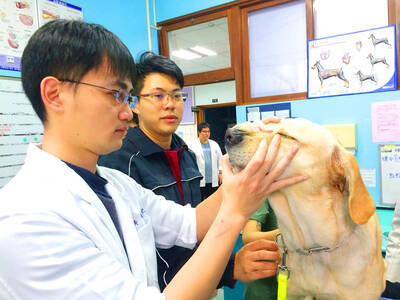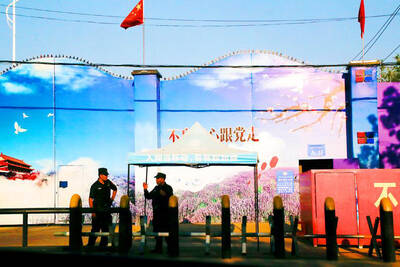A policy regulating cross-strait tourism could be revised to allow more Chinese tourists into the country if Beijing agrees to discuss the matter, the Cabinet said yesterday.
"With the introduction of extra and appropriate security measures, we can let more Chinese tourists visit Taiwan. However, details of the measures hinge on negotiations with Beijing," Cabinet Spokesman Chen Chi-mai (陳其邁) told a press conference yesterday after the weekly closed-door Cabinet meeting.
Two categories of Chinese nationals are permitted to enter the country. The first is those residing or studying overseas [including Hong Kong and Macao], while the second is those visiting a third country or conducting business via a third country.
While the nation welcomes tourists from China, Chen said, those who enter the country as tourists but engage in unapproved or illegal activities are not welcome.
Chen said that the Chinese government does not generally allow its nationals to visit Taiwan, but then blames Taiwan's government if things go wrong.
"In addition to punishing Chi-nese travel agencies offering Taiwan tours on the grounds of sabotaging national security, the Chinese government insists on conducting bilateral talks on the lifting of restrictions on cross-strait travel under the `one China' principle," he said.
The Cabinet's appeal to Beijing follows the disappearance of 17 Chinese tourists on July 13. The tourists from Fujian Province failed to meet the Taiwanese travel agency representative that was waiting to greet them at the airport. Two members of another tour group from China disappeared on the following day, and another on July 15.
In addition to demanding that the government officials responsible for the blunder be identified, Premier Yu Shyi-kun on July 21 requested a report within 15 days on how to reinforce security at ports of entry and to establish a tracking system for Chinese travelers.
During yesterday's meeting, Mainland Affairs Council Chairman Joseph Wu (
Within two weeks, tightened security measures will be applied to Chinese tourists at ports of entry and then after entering the country.
In addition to monitoring tourists from "risk areas" such as Fujian, the government will tighten the review process and even deny entry for individual tourists or tourist groups with a history of visa violations.
The Aviation Police Office will train 20 more officers to assist law enforcement personnel in administering the stricter measures for Chinese tourist groups within airports until the groups are met by Taiwanese guides. A special counter will also be set up at airports to process Chinese tour groups.
More severe punishments will also apply for travel agencies when such incidents occur. The agencies are required to hold the entry and departure permits for all Chinese tourists and return them to their owners before departure. The government will conduct random checks and visits during their stay.
Photos of Chinese tourists violating travel regulations will be posted online. Harsher punishments will apply to Taiwan nationals or companies that illegally hire or harbor Chinese nationals, Chen said.
The Cabinet is also amending several laws to better regulate travel agencies and tour guides.

Former Czech Republic-based Taiwanese researcher Cheng Yu-chin (鄭宇欽) has been sentenced to seven years in prison on espionage-related charges, China’s Ministry of State Security announced yesterday. China said Cheng was a spy for Taiwan who “masqueraded as a professor” and that he was previously an assistant to former Cabinet secretary-general Cho Jung-tai (卓榮泰). President-elect William Lai (賴清德) on Wednesday last week announced Cho would be his premier when Lai is inaugurated next month. Today is China’s “National Security Education Day.” The Chinese ministry yesterday released a video online showing arrests over the past 10 years of people alleged to be

THE HAWAII FACTOR: While a 1965 opinion said an attack on Hawaii would not trigger Article 5, the text of the treaty suggests the state is covered, the report says NATO could be drawn into a conflict in the Taiwan Strait if Chinese forces attacked the US mainland or Hawaii, a NATO Defense College report published on Monday says. The report, written by James Lee, an assistant research fellow at Academia Sinica’s Institute of European and American Studies, states that under certain conditions a Taiwan contingency could trigger Article 5 of NATO, under which an attack against any member of the alliance is considered an attack against all members, necessitating a response. Article 6 of the North Atlantic Treaty specifies that an armed attack in the territory of any member in Europe,

LIKE FAMILY: People now treat dogs and cats as family members. They receive the same medical treatments and tests as humans do, a veterinary association official said The number of pet dogs and cats in Taiwan has officially outnumbered the number of human newborns last year, data from the Ministry of Agriculture’s pet registration information system showed. As of last year, Taiwan had 94,544 registered pet dogs and 137,652 pet cats, the data showed. By contrast, 135,571 babies were born last year. Demand for medical care for pet animals has also risen. As of Feb. 29, there were 5,773 veterinarians in Taiwan, 3,993 of whom were for pet animals, statistics from the Animal and Plant Health Inspection Agency showed. In 2022, the nation had 3,077 pediatricians. As of last

XINJIANG: Officials are conducting a report into amending an existing law or to enact a special law to prohibit goods using forced labor Taiwan is mulling an amendment prohibiting the importation of goods using forced labor, similar to the Uyghur Forced Labor Prevention Act (UFLPA) passed by the US Congress in 2021 that imposed limits on goods produced using forced labor in China’s Xinjiang region. A government official who wished to remain anonymous said yesterday that as the US customs law explicitly prohibits the importation of goods made using forced labor, in 2021 it passed the specialized UFLPA to limit the importation of cotton and other goods from China’s Xinjiang Uyghur region. Taiwan does not have the legal basis to prohibit the importation of goods